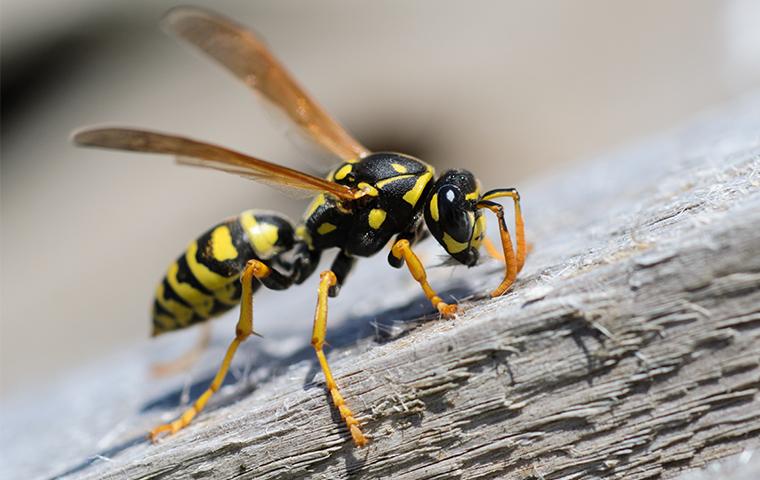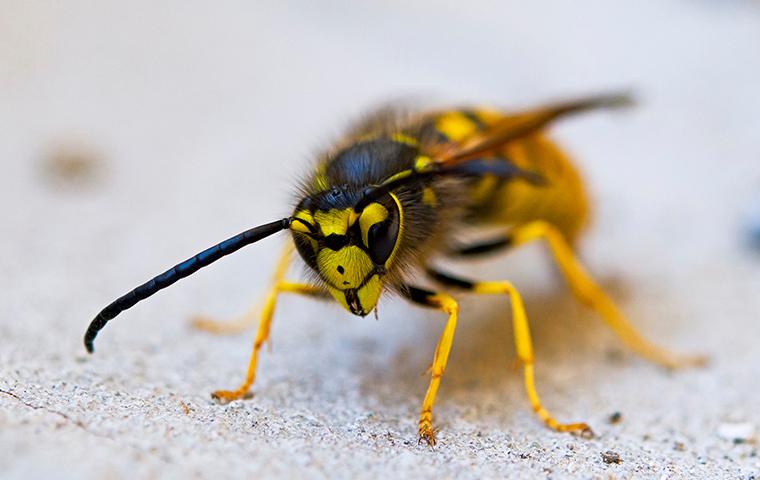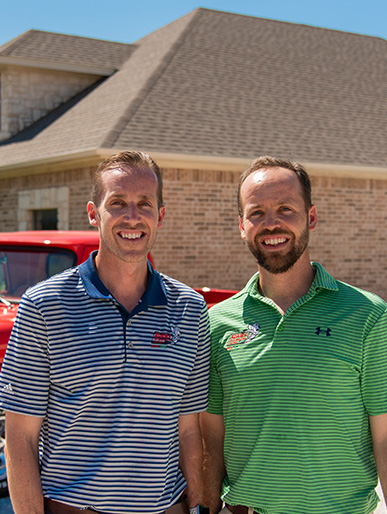
Wasps
Brief Overview of Wasps Found in Northern Texas
Though humans and other animals often fear wasps, these stinging insects play an important role in the North Texas ecosystem as pollinators of crops and flowers. They also prey on and reduce the number of nuisance insects.


.2401311642550.jpg)
Wasps are usually categorized as social or solitary: social wasps can live together in nests that contain thousands of members, while solitary wasps live on their own. There are over 30,000 species of identified wasps, but only a few of these are found in the Dallas Fort Worth Metroplex including:
Social Wasps
- Bald Faced Hornets
- Paper Wasps
- Yellow Jackets
Solitary Wasps
- Cicada Killers
- Cricket Hunters
- Mud Daubers
What Do Common Texas Wasps and Their Nests Look Like?
Species of wasp are numerous and vary in size, color, and behavior.
Bald Faced Hornets
One of the most aggressive species of wasp, they have broad, mostly black bodies with pale yellow markings on their face. These pests are often confused with their Texas yellow jacket relative. They build paper nests which are most often pear-shaped and suspended above the ground with one opening at the bottom. As their nests grow, they can reach up to three feet in size. As a result of their aggressive behavior, if you suspect a nest in or around your home, it's best to call a professional to ensure its safe and complete wasp nest removal.
Paper Wasps
Paper wasps are the most common species of wasp found in or around Texas homes. Adult paper wasps have a pinched waist and six long, thin legs “dangle” below their body as they fly. Their bodies are black or brown with yellow and/or orange markings. Their wings are gray. They are a fairly large species with adults growing to between 1/2 and 1 inch in length. These wasps build umbrella-shaped nests with visible hexagonal cells. They create their nests from paper-like material and will often attach them to branches, window frames, playground equipment, or awnings.
Yellow Jackets
Yellow jackets are an aggressive species of social found in North Texas. This stinging insect will do anything to protect its home. They earned their name from their distinct black and yellow color. Yellow jackets have a waist that is extremely thin and defined; their elongated wings fold laterally on their body when they are at rest.
Adult workers grow to be between 3/8th and 5/8th of an inch in length. Their body is hairless and has a yellow and black banded pattern on it.
Typically, the Texas yellow jacket builds its nest in the ground or in an enclosed hollow area such as a crawl space or a roof soffit. Their nests can get quite large if left alone. Like most wasps in Texas, they will not disturb people unless they feel that their nest is threatened. If threatened, they become aggressive and are able to inflict multiple stings.
Cricket Hunters
These solitary wasps are uncommon in North Texas, but can emerge in the home through gaps in the foundation. They paralyze and capture live crickets, females lay a single egg on the cricket, and then, when hatched, the larvae will eat the cricket. Cricket hunters are ½ to 1 inch long and entirely black in color. They build their nests in hollow areas and emerge in homes through small cracks or openings. If seem indoors, they may be indicative of a larger problem. Furthermore, if provoked, they will sting humans.
Cicada Killers
These are among the largest species of wasp found in North Texas often reaching lengths of 1 ½ inches long. They have a dark red head and a black and yellow striped abdomen. Primarily, they sting, paralyze, and kill cicadas to feed to their larvae. Though these wasps can be aggressive towards humans if provoked, they are a solitary species that rarely sting people. However, they can become a nuisance if present in or around a home.
Mud Daubers
These solitary wasps can reach up to 1 inch in length and are much more slender than other species of wasps found in Northern Texas; particularly, they have a thin waist located between the thorax and the abdomen. They range in color from black with yellow stripes to an iridescent blue. Their thin bodies help them navigate their tubular-mud nests. If they make it indoors, they will build their homes underneath overhangs or under eaves. These wasps can sting, but they will not attack unless provoked.
Are Wasps Dangerous?
The short answer is yes. Wasps are aggressive (especially yellow jackets and bald faced hornets) and will not hesitate to defend themselves or their nest by stinging their perceived threat. Wasps have a smooth stinger which means that they can sting their victims multiple times. A sting from a wasp is painful and leaves behind a raised, red lump that will often last for a week or more. Also, the venom that they inject is powerful enough to cause a severe allergic reaction in people that may require immediate medical attention.
What Are the Most Common Wasp Nests Found in North Texas?
Depending on the species of wasp, you can find their nests in different locations in your home or on your property. Social wasps prove to be the most threatening in homes, though solitary wasps can pose problems as well. If you notice wasps flying in or around your home, it's best to call a professional to investigate the area for a nest. Wasp nests can be found above the ground, in the hollows of walls or trees, or underground.
Nests found above the ground in North Texas most likely belong to the paper wasp. However, if larger in size, they may belong to the bald faced hornets. Both these species hang their nests from trees, shrubs, telephone poles, roof soffits, door frames, and underneath decks and porches. In order to create their nests, paper wasps and bald faced hornets chew on wood or other cellulose materials and mix it with their saliva making a paper-like material.
Like paper wasps and bald faced hornets, yellow jackets create their nest using a mixture of chewed-up cellulose and saliva. However, yellow jackets create their nest in the ground or inside fallen trees or rotten logs. If the opportunity presents itself, they may place their nest inside a home or other building; yellow jacket nests are often found inside attics, chimneys, wall voids, or crawl spaces.
The solitary species of wasps may build their nests in similar locations as a social species, and if you notice them flying in or around your home, it is best to contact a professional to investigate their source. Wasps flying in your home may be indicative of a larger nest hidden in the walls, chimney, or attic.
How Do I Get Rid of Wasps?
Getting rid of stinging insects and removing wasp nests is a task best left to professionals who have the knowledge and equipment needed for the job. At Adams Exterminating, we offer relief for wasp problems. Furthermore, we include wasp control (up to 15 feet off the ground) in our residential pest control programs. If you’re looking for one-time wasp removal for your home or business, we can help with that too. We conduct wasp removal in Dallas-Fort Worth Metroplex as well as surrounding towns and cities in North Texas. Contact us today to discuss our stinging insect treatment and removal treatment options.
Helpful Wasp Articles


